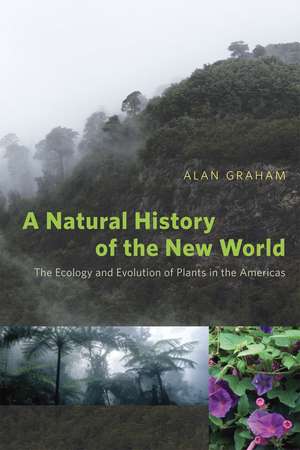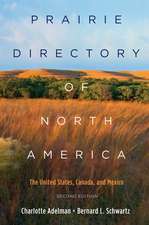A Natural History of the New World: The Ecology and Evolution of Plants in the Americas
Autor Alan Grahamen Limba Engleză Paperback – 29 noi 2010
By highlighting plant communities’ roles in the environmental history of the Americas, Graham offers an overdue balance to natural histories that focus exclusively on animals. Plants are important in evolution’s splendid drama. Not only are they conspicuous and conveniently stationary components of the Earth’s ecosystems, but their extensive fossil record allows for a thorough reconstruction of the planet’s paleoenvironments. What’s more, plants provide oxygen, function as food and fuel, and provide habitat and shelter; in short, theirs is a history that can speak to many other areas of evolution.
A Natural History of the New World is an ambitious and unprecedented synthesis written by one of the world’s leading scholars of botany and geology.
Toate formatele și edițiile
| Toate formatele și edițiile | Preț | Express |
|---|---|---|
| Paperback (1) | 446.39 lei 6-8 săpt. | |
| University of Chicago Press – 29 noi 2010 | 446.39 lei 6-8 săpt. | |
| Hardback (1) | 818.82 lei 6-8 săpt. | |
| University of Chicago Press – 29 noi 2010 | 818.82 lei 6-8 săpt. |
Preț: 446.39 lei
Nou
Puncte Express: 670
Preț estimativ în valută:
85.42€ • 93.07$ • 71.98£
85.42€ • 93.07$ • 71.98£
Carte tipărită la comandă
Livrare economică 23 aprilie-07 mai
Preluare comenzi: 021 569.72.76
Specificații
ISBN-13: 9780226306803
ISBN-10: 0226306801
Pagini: 408
Ilustrații: 69 halftones, 34 line drawings, 5 tables
Dimensiuni: 152 x 229 x 33 mm
Greutate: 0.66 kg
Editura: University of Chicago Press
Colecția University of Chicago Press
ISBN-10: 0226306801
Pagini: 408
Ilustrații: 69 halftones, 34 line drawings, 5 tables
Dimensiuni: 152 x 229 x 33 mm
Greutate: 0.66 kg
Editura: University of Chicago Press
Colecția University of Chicago Press
Notă biografică
Alan Graham is curator of paleobotany and palynology at the Missouri Botanical Garden.
Cuprins
Preface
List of Abbreviations
1 Getting Started
2 Location, Location, Location
3 Floods, Temperature, Evolution, and It’s about Time
4 How Do They Do That?
5 Early On: Middle Cretaceous through the Early Eocene
6 Transition: Middle Eocene through the Early Miocene
7 Modernizing: Middle Miocene through the Pliocene
8 Latest Touch: The Great Ice Ages
9 The Bigger Picture: Implications of Past Environmental Changes in the New World
10 Pole to Pole: A Walk over the Landscape, a Walk through Time
Epilogue
Index
List of Abbreviations
1 Getting Started
2 Location, Location, Location
3 Floods, Temperature, Evolution, and It’s about Time
4 How Do They Do That?
5 Early On: Middle Cretaceous through the Early Eocene
6 Transition: Middle Eocene through the Early Miocene
7 Modernizing: Middle Miocene through the Pliocene
8 Latest Touch: The Great Ice Ages
9 The Bigger Picture: Implications of Past Environmental Changes in the New World
10 Pole to Pole: A Walk over the Landscape, a Walk through Time
Epilogue
Index
Recenzii
“As uncertainty looms about Earth’s changing climates and the impacts these changes will have on the stability of its natural systems, scientists are working hard to predict where changes will be the greatest and most severe. One valuable approach is to look to past changes to gain an understanding of where we may be headed. This new book by Graham provides a broad synthesis of the history of natural environments in the New World with a unique focus on plants. . . . This work would make an excellent textbook for undergraduate or graduate courses in natural history or historical biogeography of the New World and is an essential reference for professional ecologists. Highly recommended.”
“For all those who’ve wanted to travel in a time machine to witness New World plant life and ecosystems since the Cretaceous period, here is your chance. This is an unprecedented and much-needed account of American natural history that will serve as the leading book of its kind for many years.”
“This book is unique in describing the biotic history of the New World from the viewpoint of plants. It documents, from Alaska to Tierra del Fuego, the incredible changes in vegetation that have occurred over the past 100 million years. Studying this turbulent biotic history is vital if we are to understand how human intervention will affect the Earth’s system; this book should be essential reading for any who wish to understand how geologic and atmospheric changes induce radical changes in ecosystems.”
“A fascinating, comprehensive, and very readable account of past and present lands and life in the New World. Alan Graham has given us a book full of tales of the wonder, grandeur, and heroism of the New World. It is full of information about geology, biology, and the history of the people who explored and discovered aspects of the ecology and the evolution of New World vegetation. It includes a broad range of topics, resulting in a comprehensive account of the natural history of plants in the Americas and the people who studied them. Graham’s half century of experience, his knowledge, and his engaging presentation of New World natural history will benefit the politician and the poet as well as the biologist, conservationist, and well-informed traveler.”
“Vivid and intuitive. . . . Readers emerge with a clearer picture of just how drastically New World physical and biotic environments have shifted over time.”









